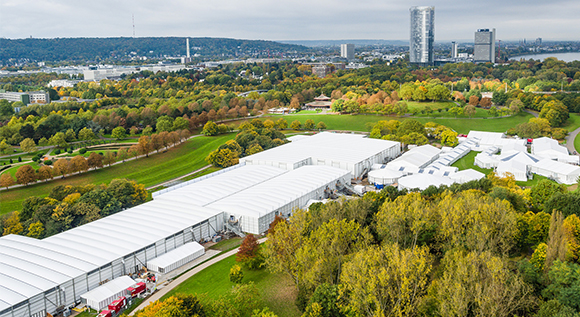Good climate in Bonn
The 2017 UN Climate Change Conference is taking place in Bonn from 6-17 November. The Economic Affairs Ministry is using this opportunity to present the energy transition as a solution for a successful effort to tackle global climate change.
 © BMUB/Dominik Ketz
© BMUB/Dominik Ketz
Germany’s energy transition is making an important contribution towards tackling global warming. Almost 32% of our electricity is currently generated from renewable energy – and thus produces no carbon emissions. For this reason, the Federal Ministry for Economic Affairs and Energy is presenting Germany’s energy transition as a possible way forward into a low-carbon energy supply at the Climate Change Conference in Bonn.
“We in Germany have formulated a clear strategy in the shape of our energy transition,” explains Federal Minister Brigitte Zypries. “We need more renewable energy and more energy efficiency. We have come a long way, but still have a lot of work ahead of us.” She stresses the importance of remembering that ecology and the economy are not opposites. She believes that other countries will only follow the German model if Germany proves that an ambitious climate policy does not come at the cost of jobs and prosperity.
German energy transition – setting a benchmark
In addition to the official negotiations, two aspects are particularly important to the Federal Ministry for Economic Affairs and Energy at the conference: Firstly, the emphasis is on a dialogue with countries wishing to switch their energy supply to renewable energy and more energy efficiency, and to play their part in combating climate change. Sharing our experience can help us to roll out the global energy transition more cheaply and more rapidly, and to limit global warming to well below two degrees celsius. At the same time, the Ministry wants to give German firms the opportunity to market their innovative products and solutions in the field of renewable energy and energy efficiency to a global audience.
For this reason, the Ministry is hosting a series of events in the German Pavilion featuring German and international energy experts in debate about the political and economic dimensions of the energy transition – including Rainer Baake, the Ministry’s State Secretary for Energy, and his counterpart from Morocco, a country with which Germany is engaged in an intensive energy partnership (find out more about Germany’s energy partnerships here). This high-level event is taking place on 11 November, the “Energy Transition Day”, which is devoted to energy-related issues. On the same day, German business, various associations, Agora Energiewende and the GIZ will also be holding events.
Another highlight in the German Pavilion is an event organised by the Federal Ministry for Economic Affairs and Energy on 16 November with Dr Fatih Birol, Director of the International Energy Agency (IEA) and Adnan Z. Amin, Director of the International Renewable Energy Agency (IRENA). The two organisations will use this as a platform to present their joint study entitled “Perspectives for the Energy Transition: Investment Needs for a Low Carbon Energy System”, which they drew up in the run-up to the German G20 Presidency. For the first time, the study shows what global investment is needed in the energy sector in order to restrict the average temperature rise to well below two degrees.
Also, the Ministry is presenting the “Smart Wall” on the German stand: an interactive wall designed to help visitors from other countries to understand Germany’s energy transition. In energy landscape displayed on it, energy consumers can be switched on and off, and the interplay of the sun, wind, etc. in power generation can be tested.
Fiji featuring Germany
The 2017 UN Climate Change Conference may be taking place in Germany at the headquarters of the UN Climate Change Secretariat, but the event is being chaired by Fiji. For the first time, a small island nation which is suffering most severely from the effects of climate change has the Presidency. Germany is the technical host assisting the small republic in the South Pacific.
The overall objective of the conference is to continue the work on the details of the Paris Climate Agreement of 2015 so that they can be adopted at the next climate summit in Poland at the end of 2018. Also, as in previous years, representatives of government, business and society are coming together to present their climate change mitigation projects. These projects are intended to show that many measures are already underway around the world to put a halt to climate change and to minimise the existing repercussions.
The conference will last until 17 November 2017. The organisers are expecting up to 20,000 participants.

